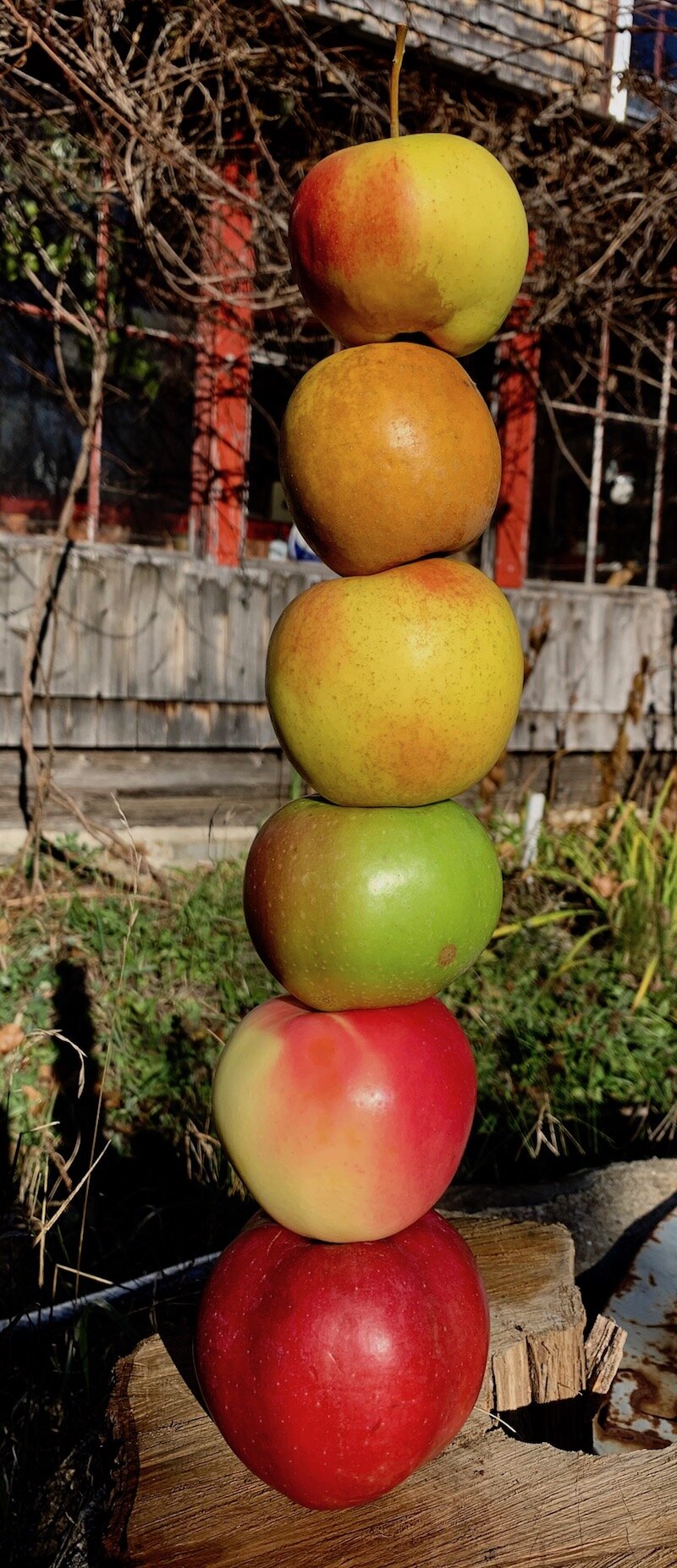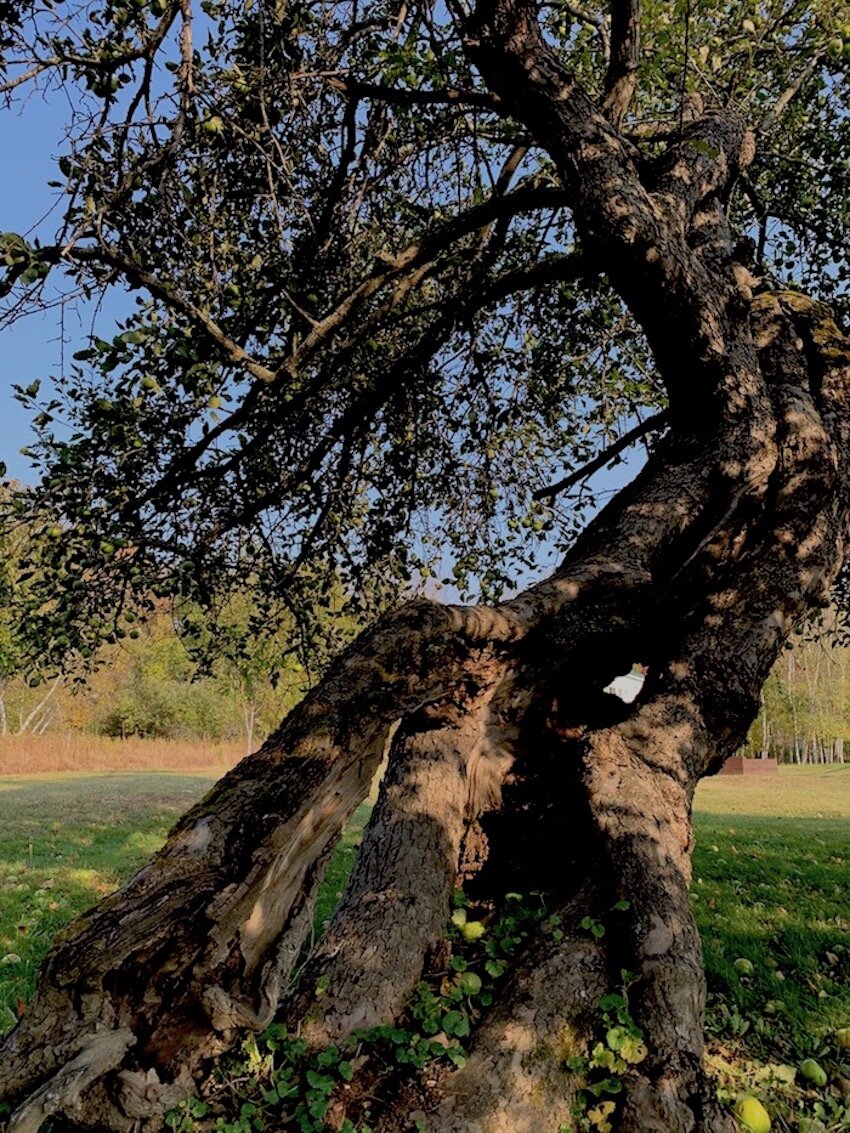Falling apples on this old, leaning Fallawater tree
“Even if I knew tomorrow that the world would go to pieces, I would still plant my apple tree”
The apple got a bad rap right from its start in the Garden of Eden, where one bite of that glorious, forbidden fruit was deemed the original sin. Today we’d like to suggest that the apple has turned around its reputation as a trouble maker and is tempting us back to a place of common ground. What other fruit or vegetable can make that claim? Certainly not broccoli that has polarized presidents and proponents. Or kale that was rescued from decorative obscurity on the buffet table and brought to culinary glory only to be tossed out of favor again by the haters who claim, “we are so over kale”. How about peppers? Have you ever tried to order family style at a Thai restaurant? Some like it hot and some not at all, and nobody really enjoys it medium. In our family of ten adults there is at least one individual who is passionately opposed to eating alliums, eggplant, tomatoes, bananas, fava beans, corn (unless it’s removed from the cob) or mushrooms. But we are all excited to gather round the apple.
John has always said that apples are apolitical. The folks that attend John’s talks in western Maine, Roxbury, MA, San Francisco, North Haven, Aroostock County and New York City come to learn about the history of the apples in their town, to discover the name of the tree in their back yard, or to share stories of their childhood fruit adventures. They ship him apples and scion wood from Ohio, Arizona, Washington, and Colorado hoping to excite him with their newest apple discovery. He partners with hunters and hikers alike since they are the ones who find the ancient apples as they trek through the woods. He has been mentored by veterans and draft dodgers, PhD’s and high school drop outs, and even a few people who don’t root for the Red Sox. They bring their apples, not their politics. For a few glorious moments when we pick, taste, cook and talk apples, we get to exist in a community without rancor or hatred. We collectively feel the comfort and warmth of a kitchen filled with baking fruit and spices, and it lifts our spirits. If Schitt’s Creek (our favorite TV show) can show us what a better world could look like, then perhaps apples can do the same.
Thank you for taking this apple journey with us this fall. No matter what happens on November 3rd, please spread the apple love and plant a tree or two. We hope to see you next September.
Picks of the week:
(Click each variety for more info)
Sun Crisp - Yes, it’s true - we have finally included an apple with “Crisp” in the name. As you have probably detected, we have a mild aversion to apples that have been selected for crispiness and juiciness over flavor. But when we heard that one of the parents of this apple was Cox’s Orange Pippin, we gave it a bite. Sun Crisp is more than just snappy - it is as complex and rich in flavor as its famous parent and holds its own in the kitchen too. It could have been a standout in your local supermarket if it weren’t for those pesky russet blotches most consumers don’t tolerate. But you know better.
Golden Russet - A perennial CSA favorite, this apple has more that a few russet blotches, but oddly not as many as it usually does. Something about the cold snap in June decreased the russeting on apples this year. However, the taste and texture are fantastic as always.
Shizuka - Another first for the CSA - a Japanese apple that is a sibling of the more famous Mutsu. We wanted to introduce you to this apple whose name means quiet, peaceful, silent, calm and serene because we are pretty sure we will need a big dose of that in our lives this week.
Fallawater - This green winter keeper is new to our CSA as well. Of German heritage, it was popular in southern and central Maine following the Civil War. Known primarily as a cooking apple, it is Josh’s pick this week for fresh eating.
Winter Banana - Whenever John gives a talk about heritage apples, someone always asks about “that banana apple”. We still don’t know if it is the flavor or the color that gave it its name, but we do know that it is an excellent keeper that must have provided a shot of sunshine during those long Maine winters, back when winter was really winter. Store it as long as you can to let it ripen. Winter Banana holds up well in the oven and is excellent sauted til golden.
Northern Spy - Another quintessential keeper that just keeps getting better as the winter progresses. We doubt you will wait that long, so go ahead and slice it up for your holiday pies. Just be sure to nibble on a few slices while you roll out the dough since it makes for good fresh eating as well. Northern Spy bruises easily, but unlike those early season apples, Spy stores well even with a few battle scars.
Our apples come to you straight from the tree, so, as with all fresh produce, please be sure to wash them thoroughly before eating. Some of the apples are grown using Integrated Pest Management by the orchards we collaborate with throughout Maine, and some are organically grown here on Super Chilly Farm.
This ancient Fallawater is still producing bushels of apples even with a hollow trunk.
Get Involved with the Maine Heritage Orchard
Currently about 300 historic apple and pear trees are enjoying the onset of winter at MOFGA’s Maine Heritage Orchard. The last of the fall weeding is done and the mouse protection “tree guards” are in place. The thousands of companion plants that surround the trees have gone dormant. The terraced hillside orchard is asleep and ready for the cold winds descending from the North.
Fall 2020 fruit exploration is also winding down. Recent discoveries will be grafted in April, added to the collection at MOFGA and planted in back yards and orchards around the state. Each of them represents another ancient Maine apple or pear saved from extinction. The collection at MOFGA continues to grow even as the old trees die out across the Maine landscape.
Perhaps you are wondering how you can get involved in discovering and saving these records of our past:
First, keep us posted on old tree sightings. We love hearing about the ancient, broken down tree hidden behind the barn or in the parking lot at the local industrial complex. It might just be the last holdout of a variety on the Maine “Most Wanted” list.
Second, volunteer at the Heritage Orchard. Look for opportunities on the website or write to apples@mofga.org.
Third, bring these old apples back to your yard and community by participating in the Stewardship Program. By purchasing a Heritage Orchard Stewardship Apple, you become the proud keeper of one of the varieties represented in MOFGA’s orchard. In the event that the orchard’s tree dies, you’ll have the backup so we can collect scion wood for grafting another.
Participate in the new “adopt a tree” program by maintaining a tree in the Maine Heritage Orchard with your gift of $25 a month. It’s automatically deducted from your credit card bill. Just go to MOFGA and clink on the link (which will be up soon) “adoptaheritageorchardtree” and enter the number of trees you’d like to support.
The work of saving Maine’s apple diversity depends on the enthusiasm and generosity of volunteers and donors from Maine and beyond. We hope that by participating in Out on a Limb CSA you have learned more about Maine’s deep agricultural heritage and the value of the past in designing the sustainable agriculture of the future. Thank you for taking this adventure with us bite by bite; we hope that we’ve inspired you to get more involved in the work to preserve old trees and restore them to the communities where they were once grown and valued.
Recipe of the Week
I didn’t intend to grow parsnips this year, but some forgotten plants from the 2019 harvest reseeded themselves and produced a bumper crop all on their own. That’s my kind of low-intervention gardening. I liked the idea of combining the sweet parsnips with a tart apple in this soup so Fallawater was my pick. In fact it was a little too acidic so I added a TBS of maple syrup at the end to mellow it out and skipped the cider vinegar. The soup wasn’t as thick as I expected so I served it with a dollop of yogurt to give it a bit more body. Throwing a diced potato in with the parsnips and apples would thicken it as well.
Apple-Parsnip Soup
Ingredients:
Alex and Josh modeling or new apple masks designed and made by students at The Community School in Somesville. Thanks so much for keeping us safe and looking good.
1 pound parsnips - peeled and diced
Juice of 1 lemon
2 TBS olive oil
2 TBS butter
6 shallots - diced
4 tart apples - peeled and diced
1 cup cider
8 cups vegetable stock (homemade or store bought - chicken stock would be fine too)
Salt and pepper to taste
Pinch of nutmeg
1 tsp cider vinegar (optional)
1 TBS maple syrup (optional)
Directions:
Put the diced parsnips in a bowl, and cover with water. Add the lemon juice. Let them sit as you prepare the rest of the ingredients. When you are ready to make the soup, drain the parsnips.
Heat the olive oil and butter in a large, heavy soup pot or dutch oven. Add the shallots and saute until translucent, 5-10 minutes.
Add the parsnips and the apples, and saute for another 10 minutes.
Add the cider, and cook uncovered for 5 minutes.
Add the vegetable stock, and bring to a boil. Cover and simmer for 40 minutes.
Add the salt, pepper and nutmeg.
Puree the soup in a blender, food processor or with an immersion blender.
Taste the soup. If it is very tart, stir in 1 TBS of maple syrup. If it needs more acidity, add the cider vinegar right before serving.
Before serving, place a spoonful of plain yogurt, creme fraiche or labne at the bottom of the bowl. Ladle the soup over the top. Serve with homemade croutons or toasted seeds.
The Abandoned Orchards of Maine
All summer long far from the roads
the abandoned orchards of Maine
have pumped out apples -
Newt Grindle, Moses Wood,
Fletcher Sweet, Hayford,
Nutting Bumpus, Sweet Sal.
And now their fruits
soft on the ground
rotting and intoxicating,
or still bobbing proud on gnarled branches -
the fruits will an extension of their rogue lives
into the final act with smell,
a scent that carries everything,
fog sunshine rain night.
October's dying apples
blend their dizzying
fragrant good byes
from the vanished farms around us.
Pam Burr Smith
from: Near Stars - New and Selected Poems- Blackberry Books, 2019




